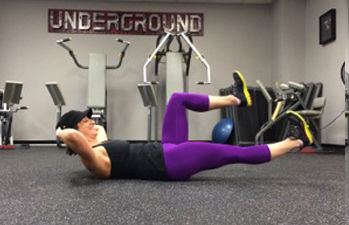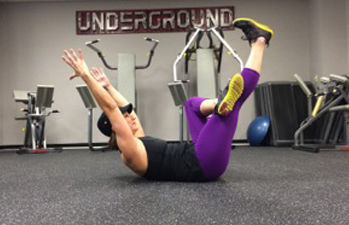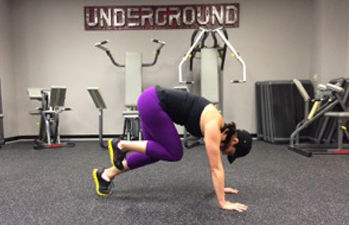The basic crunch is one of the most common exercises used to train the abdominal muscles. This classic exercise targets the rectus abdominis, the long flat muscle that extends vertically on the front of the abdomen. There are many variations of the traditional abdominal crunch, such as adding alternating knees or holding onto a medicine ball to increase the load, but proper technique must first be established before moving on to these more demanding exercises.
The traditional abdominal crunch begins by lying on your back, with your knees bent, feet flat on the floor and arms either crossed over your chest or hands placed behind your head for support. Inhale to prepare, then exhale and tighten your abdominals and raise your head and shoulders, in one unit, off the floor. Inhale and slowly return back to the floor. The movement should be smooth and controlled and tension should be felt in the abdominals throughout the exercise.
Once you’ve mastered the basic abdominal crunch, it’s easy to increase your challenge with small changes, such as an increase in the rep range, adding a leg lift or increasing the time of the exercise (e.g., lift and hold the abdominal crunch for three seconds before releasing back to the floor).
But if you are ready to supercharge your abdominal routine, try these four exercises that challenge not only your abdominal strength, but also your stability and balance. Add in a couple of changes in body positioning and these exercises will provide you an overall improvement in your postural muscles.
Hover Crunch

Begin on your back, fingertips lightly placed behind the head, right leg extended and hovering over the floor and your left leg lifted and bent to 90 degrees. Perform abdominal crunches, keeping both legs as still as possible. If you feel that you need stability to be able to perform the crunch, place the left foot on the ground and continue to keep the right leg lifted off the floor. Muscle fatigue sets in quickly with this exercise. Be very mindful that your movement is initiated from your abdominals and not from your neck.
Perform 15 reps with right leg hover. Switch sides and repeat 15 reps with the left leg hover.
Figure-4 Crunch


Begin on your back, arms extended over your head, right leg crossed over the left and left leg extended. This is a three-part exercise:
- Lift the legs.
- Lift the upper body.
- Lower both down together.
The lowering portion of this exercise should take you twice as long as the lifting portion. Take one count to lift the legs, one count to lift the upper body, and four counts to lower back down to the starting position.
Perform 10 reps with right leg in figure-4 position. Switch sides and repeat 10 reps with the left leg in figure-4 position.
Side Balance to Double Crunch

Begin lying on your right side, arms overhead, with your legs together and slightly off the floor. In one smooth motion, roll onto your back and bring the upper body and lower body together. Release back to the side balance, attempting to keep the legs lifted off the floor. If you need support, lower your top arm and place the hand on the floor.
Perform 10 reps rolling to and from your right side. Switch sides and perform 10 reps rolling to and from your left side.
Quadruped Crunch


Begin in an all-fours position. Tuck your toes under, engage your core and lift both knees about 2 inches off the ground, establishing a neutral spine. Extend the right leg behind you, you’re your toes and hips pointed down toward the ground. Draw you abdominals in and bring the right knee toward your chest and then extend the leg back out behind you.
Perform 10 reps with the right leg. Switch sides and perform 10 reps with the left leg




 by
by 






